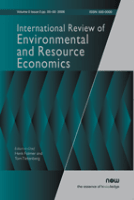
International Review of Environmental and Resource Economics
Scope & Guideline
Innovative Research at the Intersection of Economics and Ecology
Introduction
Aims and Scopes
- Environmental Economics:
Focuses on the economic analysis of environmental policies and the valuation of environmental goods and services, including carbon pricing and the impact of regulations on environmental outcomes. - Sustainable Development and Finance:
Explores the intersection of finance and sustainability, including ESG (Environmental, Social, and Governance) investing practices and the role of financial instruments in promoting sustainable development. - Climate Change Mitigation and Adaptation:
Examines economic strategies for addressing climate change, including adaptation measures and the economic implications of various climate policies. - Natural Resource Management:
Investigates the economics behind the management of natural resources, including agriculture, biodiversity, and renewable energy sources. - Behavioral and Institutional Economics:
Analyzes the influence of social norms, institutions, and behavioral factors on environmental decision-making and policy effectiveness. - Education in Environmental Economics:
Addresses pedagogical approaches and methodologies for teaching environmental and resource economics, emphasizing the importance of knowledge transfer in this field.
Trending and Emerging
- Tipping Points and Non-linear Dynamics:
Research on tipping points in environmental systems is gaining traction, emphasizing the need for understanding thresholds that could lead to irreversible changes in ecosystems. - Integration of Social Norms in Environmental Policy:
There is an increasing focus on how socially enforced norms influence environmental behavior and policy effectiveness, indicating a shift towards incorporating behavioral economics into environmental strategies. - Corporate Responsibility and Sustainable Practices:
The exploration of corporate social responsibility (CSR) and its impact on sustainable development is trending, reflecting heightened awareness of the role of businesses in environmental stewardship. - Sustainable Finance Mechanisms:
Emerging themes in sustainable finance, including green bonds and ESG investing, are becoming more prominent as investors seek to align financial performance with sustainability goals. - Gender and Climate Change:
The intersection of gender and climate change is receiving more attention, emphasizing the different impacts of climate change on women and the necessity for inclusive adaptation strategies. - Technological Innovations in Resource Management:
There is a growing emphasis on the role of technology in improving resource management and reducing environmental impacts, highlighting the importance of innovation in policy frameworks.
Declining or Waning
- Traditional Resource Exploitation:
Research focused solely on the economic exploitation of natural resources without considering sustainability and environmental impacts is becoming less common, as newer frameworks emphasize sustainable practices. - Static Economic Models:
The reliance on static models for environmental analysis is waning in favor of dynamic models that account for tipping points and complex system interactions, reflecting a shift towards more nuanced approaches. - Local or Regional Case Studies:
While still valuable, there appears to be a decrease in the frequency of localized studies, as researchers increasingly adopt a global perspective on environmental issues, especially in the context of climate change. - Descriptive Analyses without Policy Implications:
Papers that only provide descriptive analyses without actionable policy recommendations are less frequent, suggesting a demand for research that directly informs policy-making.
Similar Journals

International Journal of Ecological Economics & Statistics
Innovating Sustainable Practices through Rigorous Research.The International Journal of Ecological Economics & Statistics is a critical platform for research in the intersecting fields of ecological economics and statistical analysis. Published by the CENTRE ENVIRONMENT SOCIAL & ECONOMIC RESEARCH (PUBL-CESER), this journal aims to promote scholarly discussion and knowledge dissemination regarding sustainable economic practices and quantitative research methodologies. Despite the discontinuation of its coverage in Scopus, the journal continues to play a significant role in enhancing the understanding of the economic aspects of environmental issues within a global context. Researchers and professionals engaged in the fields of economics, decision sciences, and environmental studies are particularly invited to contribute and stay updated with the latest findings and theories. With its commitment to fostering academic discourse, the journal aspires to bridge the gap between environmental sustainability and economic growth, equipping readers with essential insights for future applications.
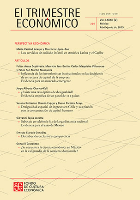
TRIMESTRE ECONOMICO
Illuminating Economic Trends Through Rigorous Research.TRIMESTRE ECONOMICO, published by FONDO CULTURA ECONOMICA, is a prominent open access journal in the field of Economics and Econometrics based in Mexico. Since its inception in 1979, this journal has served as a critical platform for disseminating scholarly research and theoretical advancements within economic sciences, addressing both contemporary issues and historical perspectives. With an impact factor that ranks it within the Q3 category among 716 journals in its field, TRIMESTRE ECONOMICO continues to contribute significantly to the academic community, providing readers with insights into economic modeling, policy analysis, and empirical research. The journal has embraced open access since 2011, fostering a broad reach and encouraging innovation and collaboration among researchers, professionals, and students. It is essential reading for those seeking to deepen their understanding of economic trends and theories, making valuable contributions to both local and global discussions.

ENVIRONMENT AND DEVELOPMENT ECONOMICS
Bridging Economics and Ecology for a Greener TomorrowEnvironment and Development Economics, published by Cambridge University Press, stands as a pivotal journal in the fields of development economics and environmental science. With a robust ISSN of 1355-770X and an E-ISSN of 1469-4395, this esteemed publication has been a significant contributor to scholarly discourse since its inception in 1996 and continues to thrive with a convergence of research insights expected to run until 2024. Distinguished by its Q1 status in Development and its Q2 rankings in both Economics and Econometrics and Environmental Science (Miscellaneous) for 2023, the journal reflects its commitment to high-impact research. Notably, it ranks 58th out of 306 in Social Sciences Development and maintains respectable standings in other categories, emphasizing its importance in shaping policies and practices at the intersection of economics and environmental sustainability. Researchers, professionals, and students engaged in these disciplines can access this journal for thought-provoking articles that advance understanding of economic development while addressing environmental challenges.

ECONOMETRICA
Fostering intellectual discourse in econometrics.ECONOMETRICA, published by Wiley, is a leading journal in the field of economics and econometrics, renowned for its rigorous and cutting-edge research contributions. With an ISSN of 0012-9682 and an E-ISSN of 1468-0262, this esteemed journal holds a prestigious position in the academic landscape, classified in the top quartile (Q1) for both Economics and Econometrics as of 2023, and ranked 42 out of 716 in its field, placing it in the 94th percentile according to Scopus metrics. The journal's scope encompasses a diverse range of topics aimed at advancing economic theory and its practical applications, making it an essential resource for scholars, practitioners, and students alike. Although it operates under a subscription model, the depth and quality of research published in ECONOMETRICA underscore its significance as a cornerstone for intellectual discourse and innovation within the field. Based in the United Kingdom, at 111 River St, Hoboken, NJ 07030-5774, ECONOMETRICA continues to attract high-caliber contributions that shape the future of econometric research.
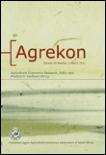
Agrekon
Exploring the Nexus of Agriculture and Economic PolicyAgrekon, published by ROUTLEDGE JOURNALS, TAYLOR & FRANCIS LTD, serves as a premier academic platform in the fields of Agronomy, Economics, and Geography, with a focus on the intersection of agricultural practices and economic development. With an ISSN of 0303-1853 and an E-ISSN of 2078-0400, this esteemed journal boasts a commendable academic standing, reflected in its 2023 quartile rankings of Q2 in Agronomy and Crop Science and Geography, Planning and Development, and Q3 in Economics and Econometrics. Established in 1962 and running through 2024, Agrekon continues to be a vital resource for researchers, professionals, and students committed to advancing knowledge in sustainable agricultural practices, economic policies, and spatial development issues. The journal is not open access, yet its findings and discussions are highly regarded within the academic community, offering insights that drive innovation and inform policy decisions across the globe. Engaging with Agrekon equips scholars with a rich compendium of research that bridges theoretical knowledge and practical application in the agricultural and economic sectors.

REVIEW OF WORLD ECONOMICS
Connecting Theory and Practice in EconomicsREVIEW OF WORLD ECONOMICS, published by Springer, stands at the forefront of economic literature, providing a comprehensive platform for scholarly articles that address contemporary global economic issues. With a distinguished Q1 ranking in the field of Economics, Econometrics, and Finance as of 2023, this journal is recognized among the top tier of academic publications, validating its commitment to high-quality research outputs. The journal's Scopus ranking places it at an impressive 70 out of 288 in the discipline, further exemplifying its relevance and impact within the academic community. Covering a wide array of topics from theoretical frameworks to empirical analyses, the REVIEW OF WORLD ECONOMICS invites contributions that not only enhance the understanding of economic phenomena but also propose actionable solutions. With an inclusive open access model enabling broader dissemination, this journal serves as an essential resource for researchers, professionals, and students alike, enriching the global discourse on economics from its base in Germany.
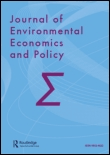
Journal of Environmental Economics and Policy
Exploring Sustainable Solutions through Economic InsightThe Journal of Environmental Economics and Policy, published by Routledge Journals, Taylor & Francis Ltd, serves as a premier platform for researchers, policymakers, and scholars focused on the interlinkages between environmental issues and economic principles. With an ISSN of 2160-6544 and an E-ISSN of 2160-6552, this esteemed journal has achieved a commendable positioning in the academic community, securing a Q2 rating in key fields such as Economics and Econometrics, Environmental Science, and Management, Monitoring, Policy, and Law as of 2023. The journal has consistently been ranked in the upper tiers of its categories, reflecting its impact and relevance in contemporary environmental discussions. Operating from the United Kingdom, this journal is dedicated to publishing high-quality research articles, reviews, and case studies that contribute to the understanding of economic strategies in environmental governance and policy-making. With an address at 2-4 Park Square, Milton Park, Abingdon OX14 4RN, Oxon, England, it invites contributions that address pressing ecological challenges through an economic lens, fostering an interdisciplinary dialogue crucial for sustainable development. Although not an open access journal, it remains influential in shaping policies and practices that align economic growth with environmental sustainability.
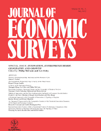
JOURNAL OF ECONOMIC SURVEYS
Transforming Data into Economic UnderstandingJOURNAL OF ECONOMIC SURVEYS, published by WILEY, is a highly esteemed peer-reviewed journal dedicated to the field of economics and econometrics. With its distinguished position as a Q1 journal and a Scopus rank of #38 out of 716, the journal consistently showcases cutting-edge research that significantly contributes to the understanding and development of economic theories and practices. Since its inception in 1987, this journal has been a cornerstone for economists, providing vital surveys that systematically address contemporary issues and emerging trends within the discipline. Researchers and practitioners alike rely on the journal for its rigorous analysis and comprehensive reviews, making it an essential resource for anyone involved in economic research. Although the journal does not currently offer open access options, its exceptional impact and relevance in the field continue to engage a global audience of scholars and policymakers.

Economics & Sociology
Advancing Knowledge in Economics and Sociology, Open to All.Economics & Sociology is a prominent open-access journal published by the CENTER SOCIOLOGICAL RESEARCH, based in Poland. With an ISSN of 2071-789X and an E-ISSN of 2306-3459, this journal has been serving the academic community since 2014 by facilitating the dissemination of impactful research in the fields of economics, sociology, and their intersections. With its rigorous peer-review process, Economics & Sociology has achieved an impressive standing in various quartiles, ranked as Q2 in disciplines such as Business, Management and Accounting, Economics, Econometrics and Finance, and Social Sciences as of 2023. Its Scopus rankings demonstrate its significance, placing it within the top percentile rankings across multiple categories. The journal aims to foster innovative and empirical research that not only contributes to theoretical frameworks but also provides practical insights into societal dynamics. By embracing an open-access model, it ensures that valuable knowledge is accessible to a wider audience, making it a vital resource for researchers, professionals, and students interested in the evolving landscapes of economics and sociology.

Indian Journal of Economics and Development
Empowering Research in Business and Development StudiesIndian Journal of Economics and Development, published by SOC ECONOMICS & DEVELOPMENT, stands as a noteworthy platform for scholarly discourse in the fields of economics, business management, and development studies. With an ISSN of 2277-5412 and an E-ISSN of 2322-0430, this journal, based in Ludhiana, India, has been dedicated to advancing research and dialogue since its inception in 2019 and is poised for convergence until 2024. Although currently ranked in the Q4 categories across various disciplines in Business, Management and Accounting, Economics and Econometrics, and Geography, Planning and Development, the journal’s commitment to fostering impactful research is evident in its wide-ranging aims and scope, which seek to explore contemporary economic challenges and developmental issues. While the journal operates without an open-access model, it provides a valuable resource for academics and professionals, and encourages contributions that address both theoretical and empirical questions. Researchers, students, and professionals will find this journal critical as it serves a vital role in the dialogue surrounding economic and developmental dynamics, particularly in an increasingly complex global landscape.